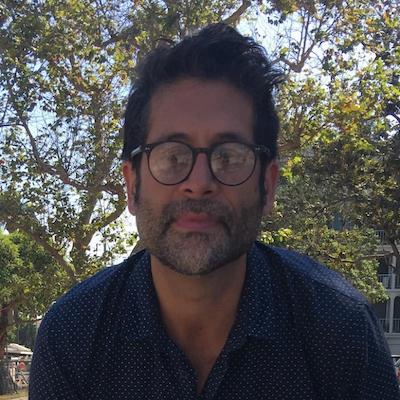 Curtis Fletcher is the Director of the Ahmanson Lab and Co-Director of the multimedia authoring platform, Scalar.
Curtis Fletcher is the Director of the Ahmanson Lab and Co-Director of the multimedia authoring platform, Scalar.
He specializes in the digital humanities and the intellectual history of technology from the mid-20th century to the present. His research centers on key questions across media studies, science and technology studies, and the history of technology. He has published widely on the evolution of educational technology, the development of humanities education, and the rise of the digital humanities. As a practitioner of the digital humanities, his work focuses on advancing digital pedagogy, fostering critical making, and developing humanities-driven extended reality (XR) projects.
Both his work in the digital humanities and his research directly inform his role as Director of the Ahmanson Lab. In his work as Director, he oversees the design and implementation of digital scholarly projects; co-leads, with USC faculty, yearlong student seminars that blend disciplinary research with hands-on digital creation; teaches a course on the history, philosophy and social aspects of simulation; and develops conferences, working groups, and other discussion-driven events that engage undergraduate students in issues at the intersection of technology and society.
Education
Ph.D. History, USC
B.A. History, UC Berkeley
B.A. Philosophy, UC Berkeley
Current Research Areas
Exploring extended reality (XR) technologies as tools to transform access, preservation, and engagement of cultural heritage materials, including their capacity to enrich public understanding of history through the reconstruction of historic sites as 3D interactive environments.
Designing and developing systems that assess the unique persuasive capabilities of large language model-powered chatbots in prolonged and personal conversations, with a focus on their potential role in disinformation, radicalization, and deradicalization.
Investigating the social, philosophical, and ideological implications of simulation technologies and AI, with a focus on how they reshape concepts of reality, identity, and truth, and on the emerging techno-ideologies—such as transhumanism, longtermism, and effective altruism—that drive their development.
- Ongoing Projects:
Simulation and Society
Silicon Valley-isms: The Quasi-Religious Ideologies Fueling the Relentless Pursuit of AI
Recent Publications
with Jaiv Doshi, Ines Novacic, Mats Borges, Elea Zhong, Mark C. Marino, Jason Gan, Sophia Mager, Dane Sprague, and Melinda Xia, “Sleeper Social Bots: A New Generation of AI Disinformation Bots are Already a Political Threat,” arXiv preprint, https://arxiv.org/abs/2408.12603 (2024).
"A Case for Scholarly Making in the Library: Makerspaces, Innovation Labs, and the Evolution of Scholarly Communications," College & Undergraduate Libraries Vol. 27, No. 2 (2021). (Routledge).
with Rebecca Corbett, Rika Hiro, and Anne-Marie Maxwell, “Unpinning Poster Archive: Building a Class Exhibition Digitally During COVID-19,” Textshop Experiments 7.5 (2020).
with David R. Ambaras, Erik Loyer, and Kate McDonald, “Building a Multivocal Spatial History: Scalar and the Bodies and Structures Project,” Platform Vol. 1, No. 1 (2019).
“Educational Technology and the Humanities: A History of Control,” in Matthew K. Gold and Lauren F. Klein, eds., Debates in the Digital Humanities 2019 (University of Minnesota Press, 2019).
with Danielle Mihram, “USC Digital Voltaire: Centering Digital Humanities in the Traditions of Library and Archival Science,” portal: Libraries and the Academy, Vol. 19, No. 1 (2019), pp. 7–17. (Johns Hopkins University Press).
“The School of Tomorrow: Promoting Electronic Multimedia Education in the 1960s,” History and Technology, Vol. 33, No. 4 (2018), pp. 428-440. (Routledge).
Recent Courses
SIMULATION & SOCIETY | CORE 499
Some technological developments can appear near totalistic in the way they remake how we think—they permeate everything, including deeply rooted perspectives about knowledge, politics, society, and even reality. Simulation is one such set of technologies.
This course offers students the opportunity to engage with technologies of simulation—ranging from extended reality and generative AI to big data modeling—to examine the shifting nature of human values, interactions, and attitudes in the early 21st century. In doing so, the course will guide students through a comprehensive, interdisciplinary study of virtual worlds, preparing them to engage with our increasingly simulated digital spaces in critical and informed ways. Students in the course also take advantage of technologies available at the Ahmanson Lab, including XR technologies, generative AI tools, bot systems, and a brain-computer interface, to gain knowledge and hands-on experience while engaging with the themes of the course.
Through readings, discussions, and the thoughtful, hands-on application of relevant technologies at the Ahmanson Lab, students examine the evolution of virtual worlds, from their origins in early mechanical simulations, stereoscopic technologies, and early film, to present-day immersive digital environments; the philosophical questions raised by VR, immersive environments, and the Simulation Hypothesis; the "end of theory" as big data models and AI replace deep theoretical understanding with predictive simulations; and the social and political implications of virtual worlds, including the ability to counterfeit people and simulate human behavior at scale.
Recent Awards
2024. Co-PI. Zumberge Preliminary Studies Research Award, USC, $50,000. Before the Bulldozers: Bunker Hill in the New Deal Era.
2023. Co-organizer. USC Visions and Voices. Making History: Seeing the Future of the Urban Past with XR Technologies, $14,000.
2022. Co-PI. National Endowment for the Humanities, Office of Digital Humanities Digital Humanities Advancement Grant, $150,000. Booksnake: Building and Testing an Augmented Reality Tool for Embodied Interaction with Existing Digitized Archival Materials.
2020. Co-PI. National Endowment for the Humanities, Office of Digital Humanities Digital Humanities Advancement Grant, $100,000. "Remastering the Renaissance: A Virtual Experience of Pope Julius II’s Library in Raphael’s Stanza della Segnatura."
2019. Co-organizer. USC Visions and Voices. Emotionally Intelligent Robots: More Human than Human? $18,000.
2018. Organizer. USC Visions and Voices. Making Data More Human: An Evening with Jer Thorp. $15,000.
2016-2018. Co-PI. National Endowment for the Humanities, Office of Digital Humanities Implementation Grant, $325,000. “Implementing Scalar for Digital Humanities Multimodal Online Publishing: Editorial and Authorial Workflow in Collaboration with Presses, Archives, and Humanities Centers.”
Memberships
Regular Member, American Library Association
Regular Member, Association of College and Research Libraries
Regular Member, Library and Information Technology Association
Regular Member, Association for Computers and the Humanities